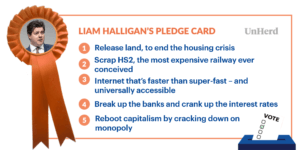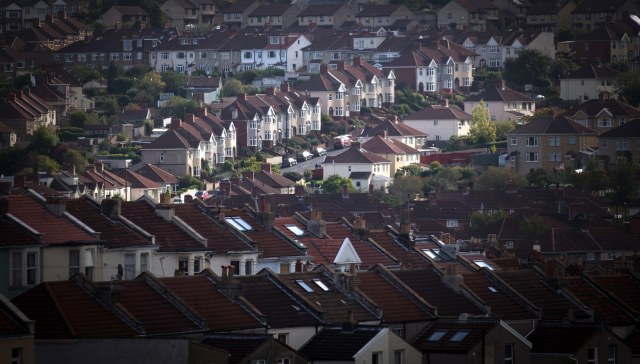Photo by Matt Cardy/Getty Images)

As our exit from Europe continues to dominate daily politics, other, vitally important areas are being neglected. So what should our politicians’ priorities be once we are beyond Brexit? We asked our contributors to draw up a pledge card for a post-Brexit manifesto.

1. Release land, to end the housing crisis
The average UK home costs eight times the median salary, rising to 12 times in London and the South East. While this is partly due to quantitative easing and loose credit conditions, the underlying reason so many youngsters are priced out of property ownership is that, for decades, we haven’t built enough homes.
The Help to Buy scheme has stoked up demand, helping over-powerful developers to make super-normal profits while producing sub-standard, under-sized homes. Reform must focus on supply – particularly changes to the 1961 Land Compensation Act, with the state using compulsory purchase if necessary to release acreage. Landowners must be fairly compensated of course, but we must avoid letting sky-high land prices feed through into the house prices faced by ordinary home-buyers.
Our opaque, dysfunctional land market is at the root of our housing crisis – which is causing misery among not only millions of aspiring homeowners, but also those in need of decent social housing. The Letwin Review explored these issues but stopped well short of tackling the vested interests – or recommending changes to existing legislation, which would be required to solve this enduring problem.
2. Scrap HS2, the most expensive railway ever conceived
The original case for HS2 – speed – has been seriously undermined by growing internet connectivity, which facilitates work on trains. The case then shifted to capacity – but the London-to-Birmingham route is already well-served, with trains only 43% full, on average.
More recently, HS2 – which is scheduled to extend from the Midlands to Manchester and Leeds – has been sold as a way of addressing the North-South divide. Yet cost-benefit analysis suggests that building better rail links between our big Northern cities – creating an alternative growth centre to London and the South East – is a far better use of public funds.
Official HS2 cost estimates have ballooned from £33bn to £56bn. Industry insiders put the eventual bill way above £100bn – which would make HS2 the most expensive railway ever built. With passenger dissatisfaction across the existing network at a ten-year high, it makes no sense to invest in a vanity project on routes already relatively well served. We need better local commuter services instead, into cities including London, Manchester, Bristol, Leeds and Newscastle, where the passenger growth has far out-paced that on inter-city routes.
Spending on HS2 (around £4bn to date) is about to crank up – to £4.2bn every year for the next ten years, as serious construction begins. We need to think not about the billions already spent, but the many tens of billions that should now be diverted away from HS2 to local rail infrastructure, buses and other vital transport projects.
3. Internet that’s faster than super-fast – and universally accessible
Around 95% of UK premises can access ‘superfast broadband’ (24-plus megabytes per second). While this is sufficient for current needs, the growing use of data-intensive services, particularly “smart” devices linked to the internet, mean we need “full-fibre” connections (at least 1 gigabyte per second).
Some 71% of premises in Spain can access full-fibre, rising to 89% in Portugal, 97% in Japan and 99% in South Korea. In the UK, the figure is just 6%.
‘Full-fibre’ networks consist of fibre optic cables running from local exchanges directly to each premises. Such infrastructure also supports high capacity mobile broadband networks – particularly future 5G networks – allowing very fast download speeds and near instant response times. Failing to build this network quickly will hold back our nation.
The Government has a target to ensure 15 million UK premises can access full-fibre by 2025 – less than 50%. Just £200m of public money has been made available, re-allocated from super-fast roll-out to full-fibre. This shows a pitiful lack of ambition and urgency. Above all, broadband infrastructure should be incorporated into all new-build homes – and BT must allow other providers to access cable ducts and digital maps on a non-discriminatory basis.
4. Break up the banks and crank up the interest rates
“A big public narrative in this country is … ending too-big-to-fail, because that process is not complete”. So said Bank of England Governor, Mark Carney, in late 2017. Since then, with the on-going Brexit row, bank reform has been out of the headlines. But that doesn’t mean the problem has gone away.
The UK failed to introduce meaningful banking reform after 2008. Far too few challenger banks have emerged to compete with the long-standing incumbents, so the UK banking sector is dominated by a few big institutions – even more so than before the global financial crisis.
The post-crisis “Vickers Reforms” were deeply inadequate – leaving investment banking and commercial banking intertwined, with the deposits of ordinary firms and households still dangerously exposed to the City’s high-risk investment strategies. The ‘moral hazard’ at the heart of the previous collapse remains, then, with the UK’s biggest banks knowing taxpayers will ultimately bail them out.
That encourages excessive risk-taking, as do ultra-low interest rates, as mainstream investors ‘search for yield’. We need to take on the banking lobby and solve ‘too-big-to-fail’. The UK should also follow the US lead and decisively raise interest rates.
5. Reboot capitalism by cracking down on monopoly
Across much of the UK, stagnant living standards and spiralling corporate profits are fuelling a sense that capitalism is skewed, with the benefits accruing to an elite few at the expense of the many. That explains the popularity of Corbyn’s anti-capitalist ideas of aggressive renationalisation and punitive taxation.
The reality is that UK capitalism needs to be updated and modernised. Many key sectors – from telecoms, housing supply, banking, power utilities and audit – are over-concentrated, dominated by a small number of large companies. This results in bad consumer outcomes – including a lack of choice, poorer customer service, low trust levels, “super-normal” profits and high prices.
British politicians have become far too tolerant of monopolies, oligopolies and other restrictive practices. When important markets are dominated by a few big providers, capitalism stops working and the customer gets a bad deal.
The UK’s last Competition Act was in 1998 – when Facebook and Google didn’t even exist. We need a period of concerted ‘trust-busting’ to inject more competition and restore public faith in ‘the system’. Capitalism works, but periodically gets silted up as incumbent firms become too powerful and capture politicians and regulators. Every few decades, the system needs rebooting – and that’s where Britain is today.
Click here to compare Liam Halligan’s pledge card to the others in our Beyond Brexit series.










Join the discussion
Join like minded readers that support our journalism by becoming a paid subscriber
To join the discussion in the comments, become a paid subscriber.
Join like minded readers that support our journalism, read unlimited articles and enjoy other subscriber-only benefits.
Subscribe